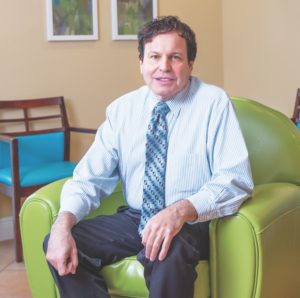
Feature
Breakthrough Testing for Cancer Treatments

In the battle against cancer, patients and physicians now have available a new, unique molecular test that can predict whether a particular cancer will respond to chemotherapy, targeted therapy, or immunotherapy before a patient is treated. Dr. Steve Mamus, a Harvard-trained molecular biologist, has brought this powerful tool to his practice at the Cancer Center of Sarasota-Manatee (CCSM).
This new advancement, GPS Cancer (gpscancer.com), is the only commercially-available test that measures the exact amount of critical proteins present on the surface of a cancer cell from the patient’s tissue sample and informs the doctor about which drugs would be most effective. “Drugs work on proteins, and whether a drug will be effective for a cancer patient or whether the patient’s tumor is resistant to a drug is determined by what proteins are expressed on the surface of a cancer cell,” Dr. Mamus said. “This technology is game-changing and is the most advanced anywhere in the world. With it we can predict a patient’s response to drugs used to treat cancer before the patient actually is exposed to the drug rather than trial and error as we do today. This is an example of a new cutting-edge, evolving standard of care. Most patients and physicians are not aware of the availability of this test because it is so new. I think it is important to let both patients and physicians know this test is available.”
The test was introduced by NantHealth in June at the American Society of Clinical Oncology annual meeting. Dr. Mamus has been able to use GPS cancer testing in about 100 patients at CCSM (941-923-1872/cancersarasota.com). This highly precise test, which is performed on patient biopsy specimens, is currently being used in patients with solid tumors in the breast, colon, lung, prostate and head and neck among others. “This is one of the most important diagnostic breakthroughs that I have seen in cancer in the last 30 years,” Dr. Mamus said.
Using lung cancer as an example, typical treatment for the vast majority of patients is chemotherapy, sometimes with radiation treatments. Standard chemotherapy, outlined in guidelines from organizations like the American Society of Clinical Oncologists and the National Comprehensive Cancer Network, often involves a combination of two drugs. Data from NantHealth using proteomics suggest that 62 percent of patients will be resistant to one of the recommended drugs while 24 percent of patients will be resistant to the second drug. “Statistically, seven out of ten patients will be resistant to at least one, if not both, drugs suggested by treatment guidelines,” Dr. Mamus said. “Someone who is really sick with a life-threatening lung cancer that can’t be treated surgically may realistically have only one shot at treatment. That means we don’t have six months to figure out that a treatment is not working. We have to get it right the first time.”
Local resident Lisa Vince knows exactly what that means, having been diagnosed with advanced lung cancer 18 months ago. Vince was referred to CCSM, where Dr. Mamus noted that her cancer had spread to lymph nodes in her mid-chest and neck. “Just standing in the waiting room and reading about Dr. Mamus, I started to develop a sense of hope,” she said. “When I met with him, I could see he is a no-frills, no-nonsense doctor who knows his stuff, but at the same time, he has a nice bedside manner. I knew I could trust him.”
Dr. Mamus recommended the GPS Cancer test, which revealed that standard treatments would not help her, but an unusual combination of drugs could be effective. Vince went to Johns Hopkins Hospital in Baltimore for a second opinion. “They told me there was nothing they could do but make me comfortable, and they didn’t leave me with any positive thoughts on my recovery at all,” she said.
After going to battle with her insurance company, she received approval to use the drug combination indicated by the proteomics test results even though it was outside of the treatment guidelines. Vince began chemotherapy in December 2015, and scans three months later showed no trace of the cancer. Subsequent scans have also remained clear. “I’ve never felt better,” Vince said. “As far as I know, I’m cancer-free. Dr. Mamus literally saved my life.”
Dr. Mamus and Vince were invited to participate at the Breakthroughs in Medicine and Technology Summit in Jackson Hole, Wyoming, this past summer. Also attending was Dr. Patrick Soon-Shiong, founder and CEO of NantHealth through which the GPS Cancer test is available. The test is an enabler for the largest global cancer collaborative, founded by Dr. Soon-Shiong, to accelerate cancer research and find therapies that use the body’s own immune system to eliminate cancer.
“Ours is the only commercial test to offer protein, DNA and RNA at this level of analysis,” said Dr. Soon-Shiong. “While genomics has undoubtedly advanced our ability to treat cancer, gene panels have only given us a partial picture and only look at a fraction of the genome. We have leapfrogged from genomics to the era of clinically relevant proteomics with this comprehensive integration of DNA, RNA to proteins and robust predictive analytics.”
Compared with other genomic testing, which may have panels of 10 to 400 genes and no measurements of proteins, GPS Cancer sequences the entire genome, consisting of more than 20,000 genes and 3 billion base pairs and proteomics.
“This is compared with the patient’s normal DNA and a database that identifies alterations in the genome and proteins. The oncologist then has a detailed molecular profile of a patient’s cancer, which enables personalized treatment strategies based on the biology of the tumor,” Dr. Soon-Shiong said.
“How can we give a drug to a patient knowing before we even start that it likely is not going to work, will have side effects, and, on top of it, they have to pay for it? A major preoccupation with guidelines may not be in the best interest of the patients,” Dr. Mamus said. “If we are really serious about ensuring best care, we have to be willing to move past guidelines that are using antiquated technologies and are known to work in only a subset of patients and look at new technologies that will accelerate the process to not only be more effective in outcomes, but more cost effective.” He also believes that GPS Cancer testing should be used as a screening tool for inclusion or exclusion in clinical trials.
Some oncologists have shied away from previous genomic testing because, unlike the GPS Cancer test, the information they were given regarding gene mutations did not translate to anything actionable for their patients. Focusing on proteomics is what has made the difference for a number of Dr. Mamus’ patients. One woman whom he treated successfully four years ago for Stage 4 breast cancer had a recurrence. Although standard tests showed her previous treatment targeting Her-2-Neu would still be effective, Dr. Mamus ordered GPS Cancer testing, which showed it would no longer work. As a result, the patient avoided undergoing treatment costing $20,000 a month that ultimately would not be effective. Another patient had a rare kidney cancer for which most treatments are ineffective. With the results from the GPS Cancer test, Dr. Mamus found that a new immunotherapy drug, which disables a protective mechanism that makes the cancer “invisible” to the body’s immune system, could work for her.
“I use the treatment guidelines as a guide, but I believe you have to have the intellectual courage to do what the molecular biology tells you to do. The era of Betty Crocker medicine is over,” said Dr. Mamus, whose passion for his patients has earned him 36 national awards for patient care, research and teaching. “The GPS Cancer test is vastly superior in diagnostics to other testing currently available. Most importantly, the patient is not subjected to costly therapies with substantial side effects that are not going to work.”
For Lisa Vince, Dr. Mamus’ caring for his patients is personal. “He is a true doctor. He is so passionate about treating cancer and really stays on top of research and development. He’s also an independent thinker who doesn’t let the establishment determine his thoughts about things,” she said. “Dr. Mamus cares about his patients and wants you to have the best treatment that can be provided for you.”







1 Comment
You must be logged in to post a comment Login